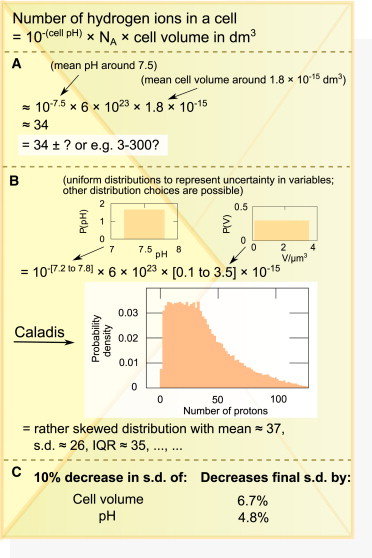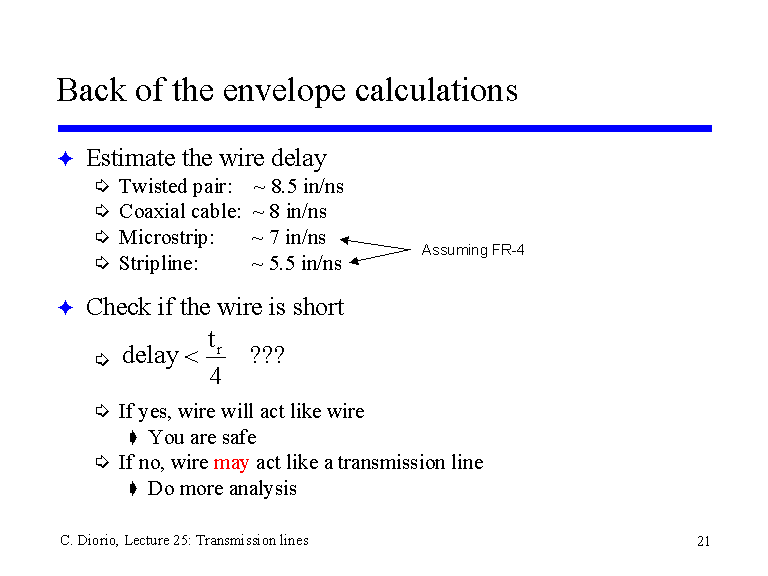This will also help later when. I do not have much experience in large scale system design.

An Example Back Of The Envelope Calculation Current Technology Is Download Scientific Diagram
Why do we need it.

. Paraxial raytracing is a valuable tool for making quick back-of-the-envelope calculations in optical system design. A very quick calculation on the back of the envelope has shown that. This type of rough mathematical calculation is not often accurate it is just an estimated rounded number computed hastily to create a ballpark figure.
A back-of-the-envelope calculation is a rough calculation typically jotted down on any available scrap of paper such as an envelope. Press question mark to learn the rest of the keyboard shortcuts. Back of the envelope calculations.
A back-of-the-envelope calculation is a form of mathematical calculation carried out quickly just to give a rough estimate of a particular calculation. A lot of back-of-the-envelope calculations are done with just coefficients and exponents eg. Back of the envelope calculation.
It is named so since you can typically carry out the calculations on the back of an envelope or a napkin. Back of the envelope calculations for system design 2011 vs 2019 query. In any solution solving or system design back of the envelope or rough estimates is one of your first steps to estimate what components subsystems or resources you need.
I am trying to understand the latency figures for various operations disk read memory read etc. Its popularity has been highly diminished as a consequence of the growing sophistication of computer-aided raytracing and the availability of powerful computers. Back of the envelope calculations for system design 2011 vs 2019 query.
The art of back-of-the-envelope paraxial raytracing. The art of estimations is pretty much a physicists bread and butter. System design interview back of the envelope calculation.
This type of calculation is used as an estimate to. Yes you do need to practice it and be at comfort with it i f you are not yet. Know the back of the envelope numbers for the building blocks of your system.
Our Back-of-the-Envelope calculator is a learning tool that allows anyone to interact with a building as an energy system. Only worrying about single-digit coefficients and exponents makes it much easier on a napkin not to speak of all. When designing your system these are the kind of calculations you should be doing over and over in your head.
Is back of a napkin also used in the. It is an informal calculation done on an envelope or a piece of paper. In this video we are going to learn about the Capacity Estimation.
A back-of-the-envelope calculation is a quick and informal mathematical computation. If I arrive at a certain number like 3M DAU with each user creating 3MB of data daily example what am I supposed to do next to justify my system handling this amount of usage. Im pretty new to system design and a bit confused as to how back-of-the-envelope calculations are used to estimate scale.
It is more than a guess but less than an accurate calculation or mathematical proof. You can see real-time energy connections between building components isolate the effects of changing a single energy parameter or produce concept-level energy and CO2 emissions estimates. You have to estimate how many servers with which specs you need.
I am studying for system design interview questions by going through the system design primer and they mention back of the envelope calculations. System design back-of-the-envelope calculations. Your goal is to get within an order of magnitude right thats just e.
C 10 e. Currently I am going through GTSDI and other system design materials for my fb onsite. Back-of-the-envelope calculations allow you to take a look at different variations.
You might also hear these called a back of the envelope calculation or a calculation. The minimal size of an Ethernet packet which such a system can possibly receive is Ethernet_Frame_Gap Ethernet_Preamble Minimal_Ethernet_Packet_Size or 12864 bytes 84 bytes. We all love a good estimation problem.
Updated easy to remember numbers for back-of-the-envelope calculations in system design interviews Powers of two table Power Approx Value Bytes Bytes ----- 10 1 thousand 1 KB 16 16 thousand 64 KB 20 1 million 1 MB 30 1 billion 1 GB 32 4 billion 4 GB 40 1 trillion 1 TB 50 1 quadrillion 1 PB. One part of system design interview is the back-of-the-envelope calculations. For interviews these should be called Side of the Whiteboard Calculations.
C matters a lot less. Press J to jump to the feed. A quick and approximate calculation that gives us further insight.
It is always a good idea to estimate the scale of the system were going to design. A similar phrase in the US. The defining characteristic of back-of-the-envelope calculations is the use of simplified assumptions.
Back-Of-The-Envelope Calculation for System Design by taking the example of TwitterSyste. I am getting familiar with most of SD concepts but still uncomfortable on back of the envelope numbers. Photo by Malcolm Lightbody on Unsplash Step 2.

Back Of The Envelope Calculator Tutorial Youtube

Back Of The Envelope Calculations Youtube
Back Of The Envelope Calculation For System Design Interviews Codementor

Back Of The Envelope Calculations For System Design 2011 Vs 2019 Query R Experienceddevs

Back Of The Envelope Calculations

Back Of The Envelope Calculations System Design Tutorial

Back Of Envelope Calculations Cheat Sheet By Matthew Bill Medium

Back Of Envelope Calculations Cheat Sheet By Matthew Bill Medium
0 comments
Post a Comment